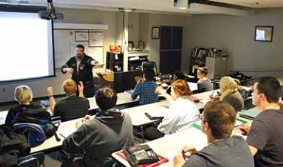 The Indiana Commission for Higher Education (CHE) today approved allowing the state’s four-year universities to grant associate degrees to qualifying students and released an evaluation of Ivy Tech Community College (a result of 2015 state legislation). Indiana Chamber of Commerce President and CEO Kevin Brinegar reacts to both items:
The Indiana Commission for Higher Education (CHE) today approved allowing the state’s four-year universities to grant associate degrees to qualifying students and released an evaluation of Ivy Tech Community College (a result of 2015 state legislation). Indiana Chamber of Commerce President and CEO Kevin Brinegar reacts to both items:
“Postsecondary attainment continues to be a major concern for the state. The goal we set in our Indiana Vision 2025 long-range economic development plan was for 60% of our residents to have a quality credential or a degree by that time; currently that number is under 35%.
“A critical piece of the solution is granting more associate degrees for students with the appropriate credit; that’s a policy we designated as a top legislative priority in the 2016 General Assembly. The rule CHE passed today can go a long way toward achieving that goal.
“Now, Indiana’s state-supported four-year universities will have the opportunity to award associate degrees to its students who clearly are no longer pursuing their education (termed “stop-out” students) but already have completed the appropriate coursework.
“This will make those students more marketable to employers and may even lead some to rekindle their learning at the college level.”
On Ivy Tech performance report:
“With today’s workforce skills challenges, the importance of the Ivy Tech mission has never been greater. This evaluation of student outcomes and recommended program enhancements will only serve to increase the effectiveness of Indiana’s community college system.
“Given the continuous improvement model that is essential for all educators and businesses, we applaud the work that has been done and we are confident Ivy Tech leaders will use the information to benefits its students and all stakeholders.”

 Armed with my Starbuck’s latte, I stepped out into the cold. It was mid-January and I was headed to Evansville to conduct interviews for our education/workforce development issue of
Armed with my Starbuck’s latte, I stepped out into the cold. It was mid-January and I was headed to Evansville to conduct interviews for our education/workforce development issue of  Making connections. It’s important to do so in so many ways. I’ll spare you the analogies in getting right to the point that tying education to careers — in other words showing students how their time in the classroom can lead to workplace success — is one of the most critical connections.
Making connections. It’s important to do so in so many ways. I’ll spare you the analogies in getting right to the point that tying education to careers — in other words showing students how their time in the classroom can lead to workplace success — is one of the most critical connections. Budgeting for
Budgeting for .jpg) I attended a
I attended a  Getting up and going to school was not often easy. Heck, it’s not even easy for many adults to go to work — and they get paid. But this story about Anthony and Alexa Thompson in the
Getting up and going to school was not often easy. Heck, it’s not even easy for many adults to go to work — and they get paid. But this story about Anthony and Alexa Thompson in the  I’ve been with the Indiana Chamber for just over a year now and in that time I’ve gotten to write about many of the Chamber’s initiatives and programs. The more I learn, the more fascinating I find the work they do for the state of Indiana. One that has really been catching my attention lately is Ready Indiana, the Chamber’s workforce education initiative.
I’ve been with the Indiana Chamber for just over a year now and in that time I’ve gotten to write about many of the Chamber’s initiatives and programs. The more I learn, the more fascinating I find the work they do for the state of Indiana. One that has really been catching my attention lately is Ready Indiana, the Chamber’s workforce education initiative. Community colleges are not lacking in attention. Indiana has a rapidly growing two-year system in Ivy Tech, which has surged the last three-plus years under the leadership of longtime Indiana automotive industry veteran Tom Snyder. President Obama has highlighted the need for additional community college graduates and certifications, including today’s White House Summit on Community Colleges.
Community colleges are not lacking in attention. Indiana has a rapidly growing two-year system in Ivy Tech, which has surged the last three-plus years under the leadership of longtime Indiana automotive industry veteran Tom Snyder. President Obama has highlighted the need for additional community college graduates and certifications, including today’s White House Summit on Community Colleges.